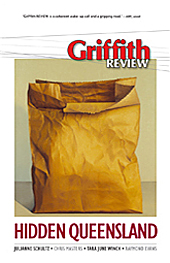Featured in

- Published 20080902
- ISBN: 9780733322839
- Extent: 296 pp
- Paperback (234 x 153mm)
IN THE FIRST of 2007, when the prospect of a change of government was beginning to be taken seriously for the first time in many years, even close observers of the political process realised there were a lot of gaps in the knowledge they needed to make informed judgements.
One well-connected insider took me aside and expressed his confusion: ‘It looks like these guys from Queensland could just win … I can see what they are doing, but I don’t understand where they are coming from. What is their intellectual tradition? What will influence the way they make decisions? What were their formative influences? How do they think? I don’t know any of this … if they were from Melbourne, or Sydney, or even Adelaide I would know this, but I haven’t got a clue about these guys. Last time I looked Queensland was a foreign country, now look at them.’
I started to explain that there is an intellectual tradition in Queensland, that it is robust and essentially liberal, and that it has prevailed despite decades of poor education and authoritarianism. As I did this, though, I realised that the answer was more complex.
The fact that these questions needed to be asked was almost as interesting as the questions themselves. Queensland has rarely had a proper seat at the table of national political conversation. Its role could be characterised as that of a troublemaker, like an unruly adolescent either inadvertently or deliberately being disruptive – remember Pauline Hanson and Joh for PM?
From a Queensland perspective, this exclusion has long rankled. It has been there since the earliest days of the colony. As the settlement around Moreton Bay struggled to survive and then to tame the vast land to the west and north, those living on the steamy banks of the Brisbane River were often aware of a censorious southern eye. They felt excluded and developed a collective chip on the shoulder to compensate for the disdain of the ‘bloody southerners’.
It is easy to forget that Queensland is much younger than the other states – it is only celebrating its one hundred and fiftieth anniversary next year – its first university was only established in 1909, half a century after similar institutions were created in Sydney and Melbourne. So, while Victoria was refining its moral certainty and protectionist ethos, and New South Wales was developing a libertarian framework to enhance its assumed leadership position, Queensland had little time for critical self-reflection. It fostered a ‘can do’ attitude while courting disaster, thanks to the extremes of nature. Queenslanders were direct, straightforward, hard working, canny and shrewd, but not generally well-educated. This has been captured in countless novels as the extremes of the place stirred the creative imagination of many of the best writers the country has produced, but has not been analysed in a way that fixed it in the national consciousness.
It is scarcely surprising that this would be unknown: until relatively recent histories of the state by Raymond Evans and Ross Fitzgerald, Queensland barely rated a mention in the general histories of Australia – a few pages here and there, but little of substance. The enduring myth of the ‘Brisbane line’ and the supposed willingness of the national government to jettison the north during World War II had a symbolic value well beyond its veracity.
For decades, Queensland was known for its extremes of weather and politics. Now it is more like the rest of the country, and an engine of national growth and innovation. The story of how it changed, who influenced it, what the consequences are – indeed, the intellectual tradition of those now occupying the highest offices in the land, is the subject addressed by the contributors to this anniversary issue of Griffith REVIEW.
Share article
More from author

Move very fast and break many things
EssayWHEN FACEBOOK TURNED ten in 2014, Mark Zuckerberg, the founder and nerdish face of the social network, announced that its motto would cease to...
More from this edition

Scratch the Surface – Flower power
ReportageThe first sight from the air is a glint in the distance, a hill, an impression of water, a scattering of buildings. Then the...

Growling at the sea
MemoirAilanman never growl the sea or anything. Not say anything bad about the sea when you are on it. Because the sea we treat...

The Olden Days – The Russian poet’s visit
ReportageThe story of the Russian poet's visit to Brisbane began with a dinner invitation from Kevin Windle, general editor and chief translator of the...